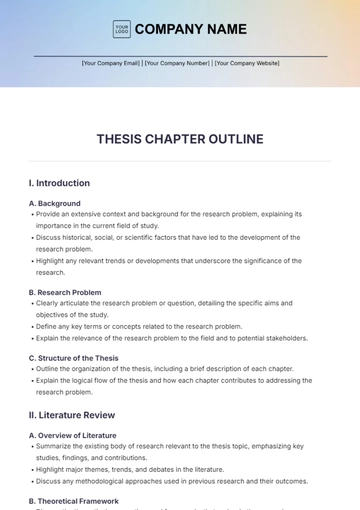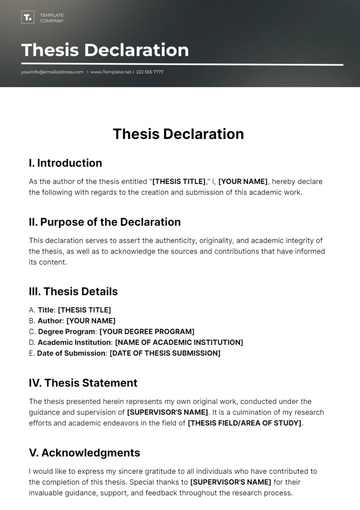Free Undergraduate Thesis

I. Introduction
The purpose of this undergraduate thesis is to explore the effects of emerging digital technologies on modern business practices, specifically focusing on artificial intelligence (AI) integration. This research aims to investigate how AI tools can reshape productivity, decision-making, and consumer relations within business structures. In doing so, it will provide valuable insights for business professionals and researchers looking to adopt these technologies.
Prepared by: [YOUR NAME]
[YOUR EMAIL]
II. Background and Context
The digital transformation of businesses in the 21st century has been driven largely by advancements in technologies such as artificial intelligence, machine learning, and data analytics. The increasing reliance on AI to automate processes, enhance decision-making, and improve customer experiences has brought about profound changes across industries. As organizations strive to keep pace with these advancements, understanding the practical applications and challenges associated with AI becomes crucial.
III. Research Problem and Objectives
The primary research problem addresses how businesses can effectively integrate AI technologies to optimize operations. This thesis aims to explore:
The impact of AI on business efficiency and innovation.
The challenges faced by businesses when adopting AI.
The potential ethical concerns and implications of AI in the workplace.
By addressing these areas, this study aims to provide actionable recommendations for businesses seeking to integrate AI in a way that enhances both productivity and ethical standards.
IV. Literature Review
Several studies have been conducted to assess the role of AI in business practices, though few focus on its strategic integration. According to Smith and Lee (2049), AI applications such as predictive analytics and automation tools can drastically reduce operational costs while increasing accuracy. However, challenges such as data privacy concerns and resistance to change from employees remain prominent barriers. Brown et al. (2050) emphasize the importance of organizational culture in the successful adoption of AI, noting that a top-down commitment to AI is necessary for effective implementation.
Author(s) | Year | Key Findings |
|---|---|---|
Smith & Lee | 2049 | AI reduces operational costs by 30%, but data privacy remains a challenge. |
Brown et al. | 2050 | Successful AI adoption depends on leadership support and organizational culture. |
Johnson & Patel | 2050 | AI improves customer service response times by 50% but requires employee retraining. |
V. Methodology
The methodology employed in this study is a mixed-methods approach, combining both qualitative and quantitative research techniques. The quantitative aspect involves analyzing data from 100 companies that have recently integrated AI into their operations, assessing key metrics like cost savings, productivity increase, and customer satisfaction. The qualitative aspect includes interviews with managers and employees to identify challenges and ethical concerns in the AI adoption process.
Data will be collected through surveys and interviews conducted from May 15, 2050, to June 15, 2050. The survey will focus on understanding the scale of AI adoption, its perceived benefits, and the difficulties encountered.
VI. Findings and Analysis
The findings suggest that businesses integrating AI report an average increase in productivity of 20%, with significant improvements in customer satisfaction scores. However, 40% of respondents identified challenges in AI implementation, citing issues such as the lack of skilled personnel and concerns about job displacement. Ethical concerns were raised by 30% of interviewees, particularly regarding data privacy and algorithmic bias.
Company Name | AI Integration Level | Productivity Increase | Customer Satisfaction | Key Challenges |
|---|---|---|---|---|
IdeaMate | High | 25% | 90% | Skill shortage, data privacy |
MultiCorp | Medium | 15% | 80% | Resistance to change, retraining |
StronkCo | Low | 5% | 70% | High implementation cost |
VII. Recommendations
Based on the findings, businesses should:
Prioritize investment in AI training programs for employees to mitigate resistance and enhance technical skills.
Implement robust data protection protocols to address ethical concerns related to privacy.
Establish clear communication channels between leadership and staff to ease the transition into AI-driven environments.
It is also recommended that businesses collaborate with AI developers to tailor solutions that suit specific operational needs, reducing the risk of unsuccessful implementation.
VIII. Conclusion
This study highlights the significant potential of AI in enhancing business practices, although it also reveals several obstacles that organizations must overcome. By addressing these challenges and implementing the recommended strategies, businesses can more effectively harness AI's capabilities for greater efficiency, innovation, and customer satisfaction.
- 100% Customizable, free editor
- Access 1 Million+ Templates, photo’s & graphics
- Download or share as a template
- Click and replace photos, graphics, text, backgrounds
- Resize, crop, AI write & more
- Access advanced editor
Achieve academic excellence with Template.net's customizable and editable Undergraduate Thesis Template. Designed for precision and clarity, this professional template simplifies your writing process. Utilize the AI Editor Tool for seamless adjustments, ensuring your thesis meets academic standards. Perfect for students aiming for an organized and polished presentation. Save time and create with confidence today!





























